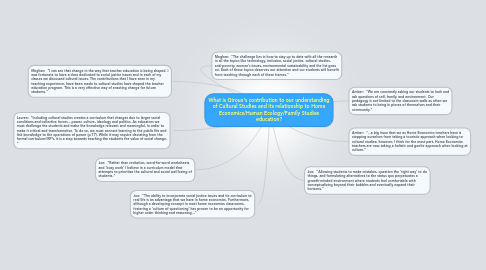What is Giroux's contribution to our understanding of Cultural Studies and its relationship to Home Economics/Human Ecology/Family Studies education?
by Amy Parkinson

1. Joe: "Rather than recitation, word-for-word worksheets and 'busy work' I believe in a curriculum model that attempts to prioritize the cultural and social well being of students."
2. Joe: "The ability to incorporate social justice issues and tie curriculum to real life is an advantage that we have in home economics. Furthermore, although a developing concept in most home economics classrooms, fostering a 'culture of questioning' has proven to be an opportunity for higher order thinking and reasoning..."
3. Meghan: "The challenge lies in how to stay up to date with all the research in all the topics like technology, inclusion, social justice, cultural studies, anti-poverty, women’s issues, environmental sustainability and the list goes on. Each of these topics deserves our attention and our students will benefit from teaching through each of these frames."
4. Meghan: "I can see that change in the way that teacher education is being shaped. I was fortunate to have a class dedicated to social justice issues and in each of my classes we discussed cultural issues. The contributions that I have seen in my teaching experience, have been made to cultural studies have shaped the teacher education program. This is a very effective way of enacting change for future students."
5. Lauren: "Including cultural studies creates a curriculum that changes due to larger social conditions and collective forces – power, culture, ideology and politics. As educators we must challenge the students and make the knowledge relevant and meaningful, in order to make it critical and transformative. To do so, we must connect learning to the public life and link knowledge to the operations of power (p.77). While it may require deviating from the formal curriculum/IRP’s, it is a step towards teaching the students the value of social change. "
6. Amber: "We are constantly asking our students to look and ask questions of self, family, and environment. Our pedagogy is not limited to the classroom walls as often we ask students to bring in pieces of themselves and their community."
7. Amber: "...a big issue that we as Home Economics teachers have is stopping ourselves from taking a touristic approach when looking to cultural studies; however, I think for the most part, Home Economics teachers are now taking a holistic and gentle approach when looking at culture."
8. Joe: "Allowing students to make mistakes, question the 'right way' to do things, and formulating alternatives to the status quo perpetuates a growth-minded environment where students feel comfortable with conceptualizing beyond their bubbles and eventually expand their horizons."


